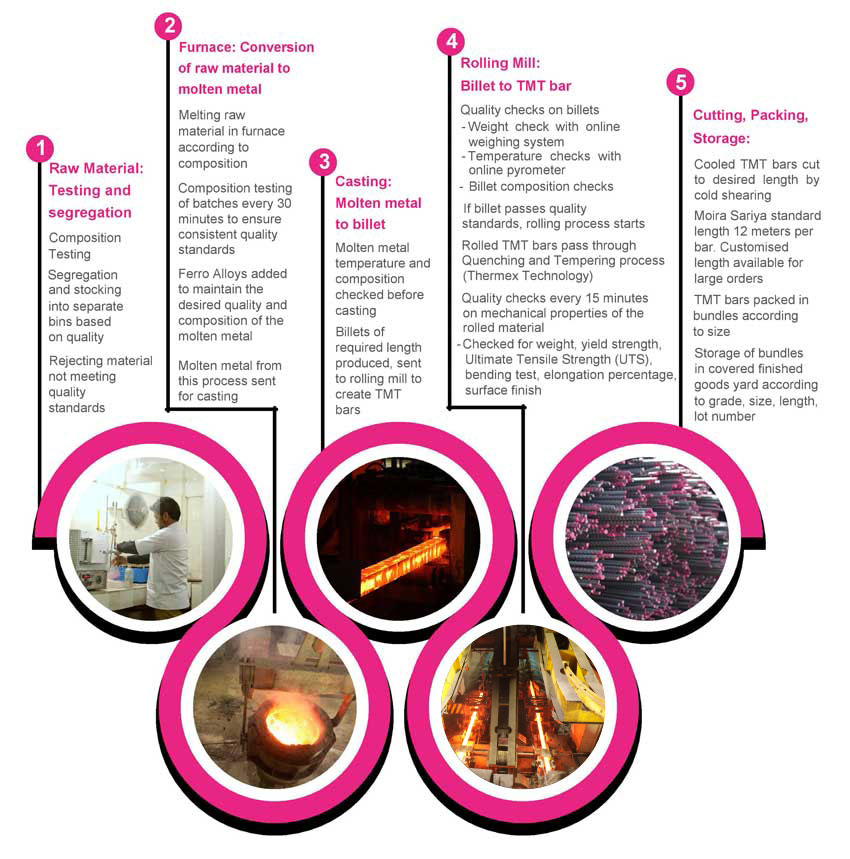Language
Language

Moira’s manufacturing processes are designed to deliver TMT bars that promise reliability, consistency, and quality. We value the trust placed on us by our customers and uphold it by incorporating robust quality control systems and adopting Total Quality Management philosophy. Manufactured under computerised quality control tests, our products conform to all specifications laid by Bureau of Indian Standards and are ISO 2009 certified.
Our experienced team of skilled professionals are trained with the latest technology to produce Thermax TMT Bars of Grade Fe-500, Fe-550, Fe-500 D and Fe-550 D. The cross-ribbed (x-ribbed) design across our TMT Bars ensures better bonding with cement. Moira TMT bars also have high strength and ductility, 100% weldability, increased fatigue resistance, better corrosion resistance, reduced construction time, and improved resistance to high temperatures. Additionally, owing to their excellent ductility, Moira TMT bars offer great construction solutions in earthquake prone zones.



Our quality policy focuses on maintaining quality checks at every stage of the production and supply chain; from the procurement of the raw material, till the final product is dispatched. It also ensures customer delight by delivering quality product consistently. We firmly believe in continuous progress and hence our manufacturing systems are regularly upgraded in order to achieve better quality resulting in high customer satisfaction.
In our pursuit of achieving products that assure consistent quality, we have employed latest manufacturing processes and stringent quality-check practices. Our TMT bars go through four stages of manufacturing before they get delivered to you.

Our TMT bars undergo some additional tests to ensure that efficient quality is maintained post production as well:
TMT samples also undergo Mandrel Bend Test in which the bars are tested on a bending machine to ensure that no cracks appear. The size of the mandrel is based on the TMT diameter using the formula TMT diameter x 5 = Mandrel diameter
Salt corrosion test is performed to check rusting. A TMT sample is half tied in a polythene, while the other half is left open. It is then immersed in salt water, usually for a period of 96 hours, and is then kept in the open for a few days to see how soon rust is formed on the TMT bar.
We assure unconditional guarantee on our products. We guarantee a free return policy in case the product delivered does not match the standards specified by us.
At Moira, we also offer the facility of quality testing of any brand sample in our labs absolutely free of cost. Consumers can send a request for a Lab test along with the product sample. Post conducting the tests on the samples, the composition report will be shared. Click here to request for a lab test at Moira facilities.
Customer satisfaction through quality product is the key focus for us at Moira Sariya. To ensure customer satisfaction, we support customers who wish to cross-verify quality of our products (chemical and mechanical composition as specified by us) through independent lab tests on any random sample of Moira TMT bars. We also fully reimburse the lab cost for such tests at any BIS approved lab. Click here to fill in a request for pre-approval from Moira for payment of independent lab test of Moira TMT bar sample.
To generate awareness about quality TMT bars, we’re cataloging some checks that could be performed by our customers to ensure product quality.
Higher bendability in TMT bars is a great advantage. TMT bars are required to be bent and moulded into various shapes as per requirements at construction sites. Higher bendability ensures ease of use at construction site without breakage in the product. The ideal TMT bar should be flexible, and hence should develop no cracks even if it is bent at an angle equal to or higher than 90 degrees. Bendability in TMT bars can be tested by doing a Mandrel Bend Test. In this test a TMT bar sample is tested on a bending machine to see if any cracks appear on the sample. The size of mandrel is decided based on the TMT diameter. The process to decide the size of mandrel is a simple calculation, TMT bar diameter * 5 = Mandrel diameter. Example, to test 8mm TMT bar (8 * 5 = 40), 40mm mandrel should be used.
The more difficult it is to bend the TMT bar, the better it is. If correct size of mandrel is used and the TMT bar cracks, then the TMT bar quality is poor. However, if the TMT bar cracks on using incorrect mandrel size, then TMT bar quality is not the issue, the mandrel size used is wrong.
Building structures are designed by architects with specific ISI TMT bar specifications as they provide structural strength to the building. Buying underweight TMT bars can be detrimental to the building structure. Using an underweight TMT bar will lower the strength of the structure and compromise its safety. Consumers can check whether the TMT bar they are buying is of standard weight as specified by Bureau of Indian Standards by referring to the table below with ISI specification. In case the weight is less than the specification, it is not ISI compliant. In case the weight is more than specification, a consumer ends up paying more for extra weight over and above the specification.
1) Weight test with 1-meter TMT bar sample
2) Weight test with a bundle of TMT bar
| TMT Diameter (mm) | Standard TMT Length (meter) | Weight per Meter (Kg/Mtr) | No. of pcs in 1 bundle | 1 bundle weight (Kg) | 1 bundle weight (in Kg) + Packaging Weight (380 gm) | Tolerance % |
|---|---|---|---|---|---|---|
| A | B | C | D | E | F | G |
| 8 | 12 | 0.395 | 18 | 85.32 | 85.70 | +/- 7 |
| 10 | 12 | 0.617 | 12 | 88.85 | 89.23 | +/- 7 |
| 12 | 12 | 0.888 | 8 | 85.25 | 85.63 | +/- 5 |
| 16 | 12 | 1.579 | 5 | 94.74 | 95.12 | +/- 5 |
| 20 | 12 | 2.468 | 3 | 88.85 | 89.23 | +/- 3 |
| 25 | 12 | 3.850 | 1 | 46.20 | 46.20 | +/- 3 |
| 32 | 12 | 6.318 | 1 | 75.82 | 75.82 | +/- 3 |
| 36 | 12 | 7.99 | 1 | 95.88 | 95.88 | +/- 3 |
| 40 | 12 | 9.86 | 1 | 118.32 | 118.32 | +/- 3 |
Salt corrosion test is performed to check rusting. A TMT sample is half tied in a polythene, while the other half is left open. It is then immersed in salt water, usually for a period of 96 hours, and is then kept in the open for a few days to see how soon rust is formed on the TMT bar. TMT bar with low corrosion resistance will rust.
Jaideep Ispat & Alloys Pvt Ltd
Plot No. 808 A-E, Sector III,
Industrial Area, Pithampur,
Dist. Dhar (M.P.)
0731 254 9781, 8889914004
Please fill in the detail in this below form, we will contact you soon.
Please fill in the detail in this below form, we will contact you soon.
Please fill the form below. We will revert soon.
Please note all fields are mandatory